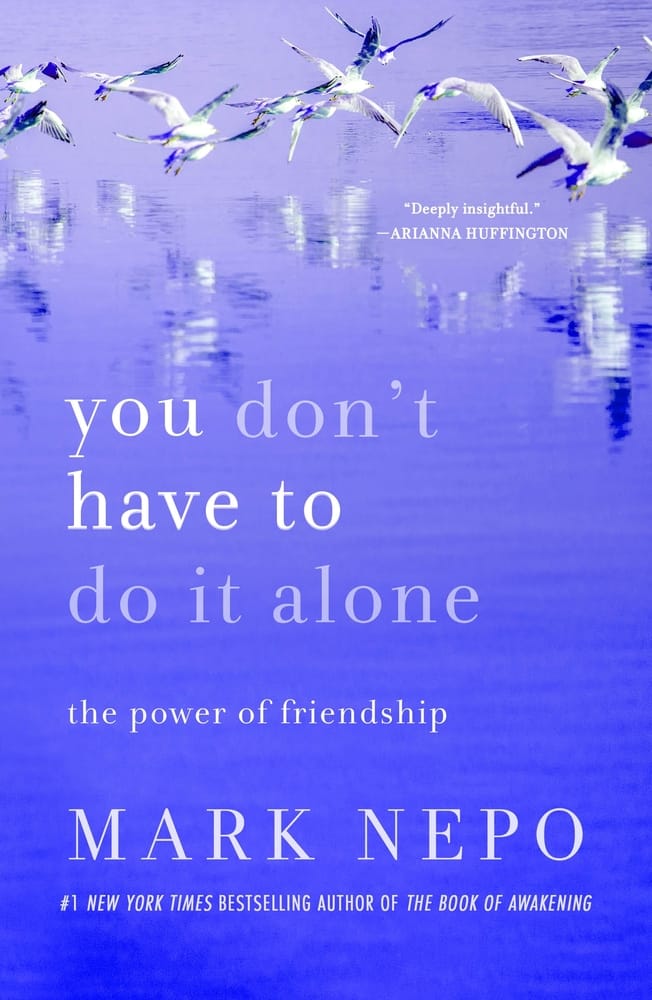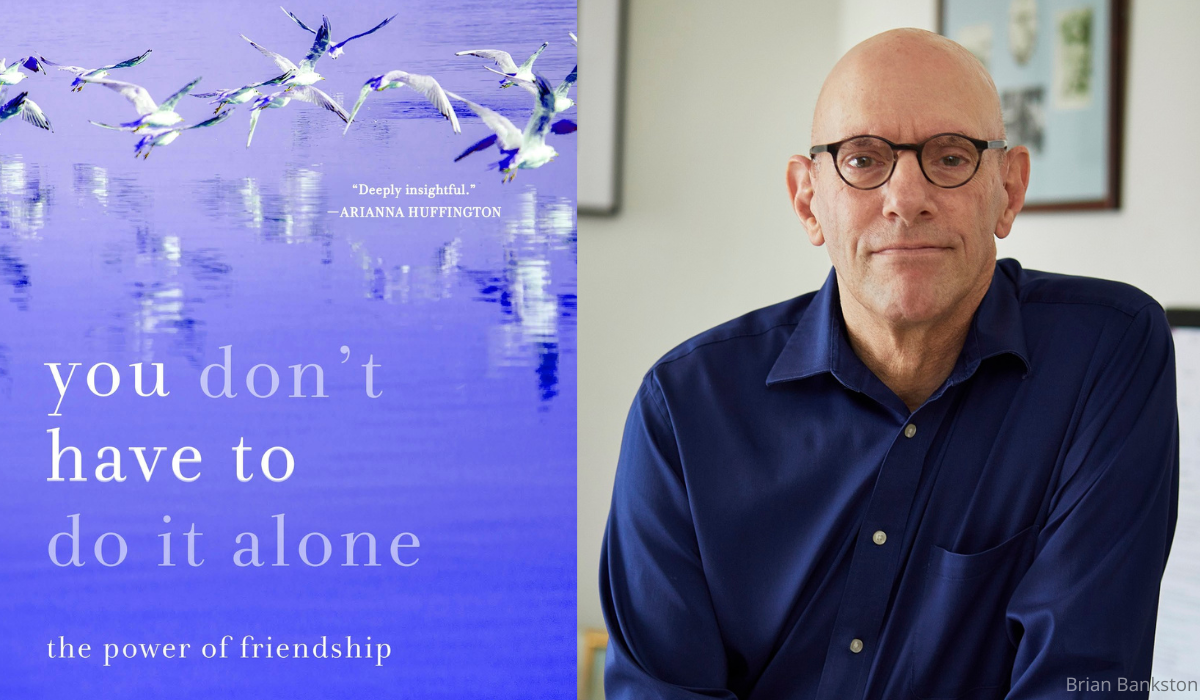Mark Nepo Shares Why a True Friend Can Help Us Find Our Ground, Even in Tumultuous Times
In deep ways, friendship is the vocation of seeking truth together. And seeking truth together is like finding a clearing in the forest in which you can breathe and feel the connection that exists under all trouble. Seeking truth together is the call to find meaning in life in the trusted company of others.
Aristotle described friendship as the art of holding up a mirror to each other’s souls. Yet, anyone who’s lived knows that friendship involves more than just mirroring. Love requires listening, holding, feeding, and soothing. Love requires being ready to help once your friend faces what they see in the mirror.
Once we resolve to be there for each other, time and distance become inconsequential. The deepest of friends pick up, after an absence, as if no time has passed. The German writer Goethe said:
To know someone . . . who thinks and feels with us, and, though distant, is close to us in spirit, makes the Earth an inhabited garden.
During the Tang Dynasty in China, the legendary poet Li Po wrote his poem “Letter in Exile” to his lifelong friend So-Kin. They had schooled together and became civil servants stationed a thousand miles apart. And though they only saw each other a handful of times throughout their lives, their friendship was a clearing in the forest of time in which they could see the Heavens and remember the sweetness of what matters, despite all their hardships.
Their bond was a star by which they could navigate the world. Though they hardly saw each other, their friendship was a constant foundation. Filled with So-Kin’s presence, Li Po wrote a poem for his friend affirming that “[t]here was nothing of cross-purpose” between them. By the end of the poem, he appears at once refreshed and saddened by his love for his dear friend. Thinking, “There is no end of things in the heart,” he signed the poem and had a boy ride with it across the vast plains of China.
I’m grateful that I have such friends by which I navigate the world. And though we’ve made our way through different professions, though we’ve each suffered different maladies and losses that carved different shapes of emptiness through which we now sing, we continue to seek truth together. Like Li Po and So-Kin, we remain in agreement about the deeper nature of things.
A poor friend requires his companions to live the way he does. A good friend encourages his companions to honor their own path while not judging each other. I admit I have had poor friends, so insecure that one life wasn’t enough to verify their existence, and so, they pushed their way on me. And I confess, before great love and great suffering forced me to grow, I was at times a poor friend. So blind, at times, to my own worth that I needed those around me to swear that I was real.
A mythic example of a poor friend is the story of Gilgamesh and his innocent companion, Enkidu. In this Assyrian tale recorded on clay tablets over five thousand years ago, Gilgamesh is a bored and empty king who, in looking to be enlivened, wages war against the nature deity, Hum- baba. In his reckless attempts to feel, needless men die, including his only friend, Enkidu. In his grief, Gilgamesh seeks out the Immortal One, Utnapishtim, demanding that his only friend be restored to life. Utnapishtim can see that it was the king’s self-absorption and reckless attempts to stimulate his heart rather than feel that were responsible for Enkidu’s death. Shaking his head, the Immortal One is firm with Gilgamesh and sends him away to learn through his grief how to be a better friend.
These stories reveal archetypal passages we each must face, if we are to discover true friendship. The story of Gilgamesh warns us that being self-centered and reckless can put our friendships in jeopardy and leave us all alone. In contrast, Li Po’s love of So-Kin shows us that only beyond our self-absorption can we find the common ground where there is no cross-purpose between us. Only when our love of another mixes with our true concerns for life can true friendship withstand the years and miles.
Yet, we cannot plan such meaningful connections. We can only stay open to being touched by others and to giving without restraint. For it’s almost impossible to see a friendship coming. In 1777, James Boswell, the biographer and friend of Samuel Johnson, concluded:
We cannot tell the precise moment when friendship is formed. As in filling a vessel drop by drop, there is at last a drop which makes it run over; so in a series of kindnesses there is at last one which makes the heart run over.
When in the throes of cancer, I had a dear friend arrive with his big laugh and resolute commitment to help me through. His name was John Sackett and his laugh was as bright as his red, disheveled hair. He always spoke too loud when excited and too soft when suddenly moved. He was a golden bear, always knocking things over in his enthusiasm.
It was 1987 and I was about to have an open biopsy on my skull, to determine what kind of cancer was pressing on my brain. There was only one lab that could perform the necessary tests on the sample of my tissue. But the sample had to be refrigerated and it was a three-hour drive south of the hospital. Unexpectedly, there was lots of red tape about insurance and proper protocols. So, with my head shaved, I was made to wait in the foyer of the operating room till this could be figured out. After forty- five minutes, I was wheeled in.
I learned later that John had pushed his way in to see my neurosurgeon and said, “I’ll drive the sample myself!” And he did just that, racing down the New York State Thruway with tissue from my skull in a cooler beside him. Without knowing of his kindness, I slept in the hospital.
John died eighteen years ago from his own journey with cancer. I think of him often and thank him just as often. Like Gilgamesh in his grief for Enkidu and Li Po in his love for So-Kin, I send the beat of my heart to John somewhere on the other side. John’s love taught me that though no one can cross the sea of trouble for you, friends are oars.
More recently, I was flying over the Pacific Ocean, on my way to Maui, to meet a friend who has a deep passion for seeking truth, Oprah Winfrey. She had kindly invited me to come for a conversation that would be filmed as part of her Super Soul Sunday TV show.
I had never been to Hawaii and so read all I could about the string of jewels laced in the middle of the Pacific. One place on Maui fascinated me, a delicate bamboo forest, known for the bend and hollow of its slender trees. The natives call this grove Paia, which means “a clearing in the forest.”
During the night flight, I wrote and emailed the following poem to Oprah in anticipation of our conversation:
We agree to meet half way
round the world where the ocean
waited thousands of years before
opening its clear mouth to speak
this island under the sun. All to
remember: we are students of the
large stillness, struggling with our
little stillness. Never knowing what
will rise between us, we meet beyond
the bamboo forest and bend in
the light, hollow as these stalks,
listening for a trace of the
beginning, as we do.
When we can listen together, never knowing what will rise between us, evoking the large stillness while struggling with our little stillness, we are practicing spiritual friendship.
I want to share a moment from my time in Maui, because it speaks volumes about the nature of friendship. Off camera, before we began to record, Oprah pulled me aside and said, “This is your time. I don’t want you to leave anything unsaid that’s on your heart.” I felt so welcomed and empowered that I believed her. I felt her belief in me. Because of this, we entered such a deep space together that I left more myself. And it has stayed with me.
On the flight home, I realized that my soul had grown for being in my friend’s company. Isn’t this the work of friendship? What more can we ask of each other than to grow in each other’s company? And so, I’m compelled to say to you, “This is your time. Receive everything and don’t leave anything unsaid that’s on your heart.”
Seeking truth together is like finding a clearing in the forest in which you can breathe and feel the connection that exists under all trouble.
Thresholds to Friendship
• In your journal, tell the story of a time when you sought truth with another. How did this journey impact you and your relationship?
• In conversation with a loved one, tell the story of a friend in whose company you have grown to be more yourself. Later, write a letter of gratitude to this friend, mirroring the gifts of soul you see in them.

From You Don’t Have to Do it Alone: The Power of Friendship, by Mark Nepo. Copyright (c)2024 by the author, and reprinted with permission of St. Martin's Publishing Group.
Mark Nepo is a bestselling author, poet, and philosopher who has taught in the fields of poetry and spirituality for over 40 years. Learn more at marknepo.com
Please note that we may receive affiliate commissions from the sales of linked products.



